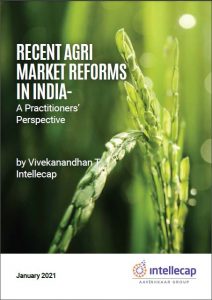Recent Agri Market Reforms in India – A Practitioner’s Perspective 2021: White Paper by Vivekanandhan T, Intellecap

Government of India (GOI) had recently enacted three acts related to agriculture marketing in the country; these acts have come closely on the heels of other agriculture related measures from the government.
These measures together form a part of government’s larger mission to double farmers’ income by 2022-23. In this backdrop Intellecap had organized a panel discussion on the recent agriculture market reforms; the session was organized as a part of Intellecap virtual Sankalp Global Summit 2020.
The panel discussion titled “Recent Agri reforms- Shifting grounds for FPOs, Agri startups, and Philanthropic capital” was organized on 2nd November 2020. The panel consisted of experts from i) World bank ii) NGOs working with small holder farmers and FPO formation iii) Agri e-market makers and iv) Agri start up working with FPOs.
The perspectives and some deep insights on topical issues are synthesized and presented under following categories: a) Small and Marginal Farmers’ perspectives; b) Production system perspectives; c) FPO perspectives; d) Agri market place perspectives; and e) Agri startup perspectives and f) Other ecosystem perspectives. This document titled “Recent Agri reforms in India- Practitioners’ perspective” aims to take these insights to a wider audience and to take forward some of the pertinent issues for further policy deliberations.
Snapshot of the insights
Small & Marginal farmers’ perspectives:
- Agri market reforms alone will have little effect on small and marginal farmers as many of them are in to subsistence production
- The provisions under contract farming and the infrastructure development support available under Agriculture Infrastructure Fund have the right incentives to move small & marginal farmers from subsistence cereal crop to commercial cash crop farming.
Production system perspectives:
- Agri market reforms by the Government of India have adopted a market led approach for development of production & marketing infrastructure
- Though the recent agri reforms have paved way for market players to invest in improving production & marketing infrastructure, however they cannot completely replace the deficit public investment long overdue in the agriculture sector.
FPO perspectives:
- Agri market reforms have increased FPOs’ ease of transaction with farmers and FPOs are now increasingly recognized as entities that represent the collective interests of their member farmers (in contrast to a private enterprise)
- Though the FPO formation has been taken up aggressively by the Government of India, however the sustainability of these business enterprises still remains largely unaddressed
- The role of support ecosystems become critical for sustainability of FPOs beyond government’s mission mode of FPO formation
- As market forces are ruthless and weed out players who aren’t resource efficient , any form of government support or ecosystem support are only a necessary condition but not a sufficient condition for FPOs to prosper
- Alternatively established corporates and business houses can co-opt FPOs in to their supply/distribution chain and can help them to build capacities & create efficiencies.
- There are successful working models of joint ventures between FPOs & large private players that are creating value for farmers at the same time competing successfully with other players in the market
Agri market place perspectives
- By limiting the role of APMC, the Government of India has created a policy push for “one nation one market” initiatives
- APMC mandis played a critical role in price discovery for certain essential commodities. The price discovery mechanisms that shall play out in the new age markets will require further attention.
- As the agri market reforms have now enabled direct procurement from farmers, there is an increasing need for legal provisions & legal counsel to protect farmers in the case of buyers not honoring payments.
- Though the New Farm Acts, 2020 have defined aspects of e-trade however crucial elements like e-marketing and e-market places have not been covered.
- New age agri market players in their pursuit of higher margins, may end up taking multiple position in the agri value chain, thereby creating “conflict of interest” or/and “concentration of risk”
- These forces may lead to market failures which in turn has the potential to destroy the trust in the functioning of agriculture markets
Agri start-up perspectives:
- Like in the case of FPOs the agri market reform have also enable Agri start up to deal directly with farmers, thereby reducing the transaction cost and time
- The agri market reforms have also created an opportunity for all types of private enterprises including agri startups to participate in primary agriculture production and primary agriculture marketing
- As agriculture markets are getting liberalized, there is a need for a market regulator to create level playing field and prevent creation of oligopolies and other forms of collusion
Other ecosystem perspectives:
- Among the different set of private players, corporates and large enterprises are better positioned to make investments in improving agriculture infrastructure
- Though the agri market reform have created sufficient incentives to attract private investment, there are limited use cases readily available for private investment
- It is also worthwhile to observe how the existing value chain players consolidate their positions and take advantage of the emerging new age value chains.
- In the recent past organized markets like cotton has suffered from the influence of speculative market forces, which have found their way to influence commodity prices.
- As farmers are the most vulnerable, there is a need for agencies to protect farmers’ interest from the adversities of complex market dynamics




